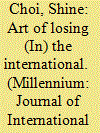| Srl | Item |
| 1 |
ID:
152112


|
|
|
|
|
| Summary/Abstract |
North Korea is an illustrative limit case for exploring contributions of an aesthetic approach to ‘decentering’ IR and taking seriously non-Western subject positions and agencies.1 North Korea is an international problem of human rights, poverty and security that sits across an enemy line, a line where empathy ends and the terrible begins. There are good reasons to condemn, hate and close down our ability to imagine subject positions – the source of life – across this enemy line. Here we can point to its notorious labour reeducation camps and frequent political purges and executions.
|
|
|
|
|
|
|
|
|
|
|
|
|
|
|
|
| 2 |
ID:
173399


|
|
|
|
|
| Summary/Abstract |
Marysia Zalewski's Feminist International Relations: Exquisite Corpse on feminism and global politics directly addresses matters of style, that is, questions of language and representation that foreground the invisible yet so palpable aspect of how meanings circulate. This article puts Zalewski's work in conversation with Trinh Minh-ha's D-Passage: The Digital Way and Lynda Barry's What It Is that similarly push the limits of how we craft feminist arguments. These feminists show how styles of writing and thinking, and how ideas gain shape to circulate matter in academic sites of knowledge as much as in art and culture. Building on these works, I put forward the thesis: to theorise is to feel out boundaries and question the questions we encounter that perennially relegate women as taint and malaise. I further explore this thesis by highlighting the visual dimensions of writing and thinking, in particular, what drawing, and drawing lines that shape ideas do. I focus on caricatures from the currently evolving North Korean nuclear crisis to loosen up the ways we go about thinking about war and politics wherein thinking is recognised not so much as a craft to be perfected but a democratic form of being in the world.
|
|
|
|
|
|
|
|
|
|
|
|
|
|
|
|
| 3 |
ID:
186984


|
|
|
|
|
| Summary/Abstract |
This article serves as an introduction to the International Affairs special section, ‘Feminist interrogations of global nuclear politics’. In this article, we argue that feminist International Relations scholarship on the global nuclear order and its discontents should be revitalized, in ways that reckon more fully with the colonial matrix of power and its contemporary realignments. As the initial step in such a task, the first part of the article explores some of the distinctive insights that are generated about global nuclear politics by a feminist approach that takes coloniality seriously. We show that such an approach reconceptualizes nuclear destruction as a lived reality for many, within a broader history of domination; exposes the racialized, gendered and colonial dimensions of nuclear discourses; and casts fresh light on the material colonial relationships at the heart of the global nuclear order. In the second part, we reverse our focus to critically think through how the content of feminism, and its relation to coloniality and struggles for self-determination, might be understood differently if we start from a concern with global nuclear politics. The third and final part surveys the articles in the special section, highlighting where they pick up on the themes we have explored and some future lines of enquiry.
|
|
|
|
|
|
|
|
|
|
|
|
|
|
|
|